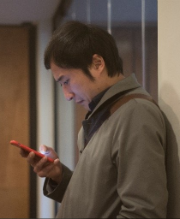In January 2016, a cold case, the ‘Itaewon Murder Case’, was finally solved after 19 years. The Seoul High Court handed down a 20-year jail term and, finally, what the bereaved family had long hoped for was resolved. In the process of identifying the true criminal, the populace made a big contribution to the case.
 |
Itaewon Murder Case
Remains Unsolved
In April 1997, Edward Lee and Arthur John Patterson, with several teenagers, were having a party in Itaewon. When Patterson used a pocket knife to cut his hamburger, they talked about the knife. When Patterson and his friend Lee went to the bathroom, they came in contact with a 22-year-old Korean, Jo Jung-pil. Patterson stabbed him several times with the pocket knife. Without investigating the case in detail, the prosecution convicted Lee of murder, while Patterson was convicted of possession of weapon. Later in 1999, Lee was acquitted by the court because of insufficient evidence. Also, Patterson was released from prison after his sentence had concluded. So there was a victim, but no perpetrator.
Why Unsolved?
The first reason why this murder case remained unsolved was because of SOFA (Status of Forces Agreement), which establishes the rights and privileges of foreign personnel present in a host country. So it was difficult to locate the suspects’ whereabouts. Unfortunately, investigating the case properly was nearly impossible.
Second, double jeopardy was prohibited. This means if a trial has ended, there can be no more judgments passed on the case. Although the victim’s parents had strongly insisted Patterson’s role in the homicide, after he was sentenced to jail, additional punishment to Patterson couldn't be allowed because of the prohibition of the double jeopardy.
The immature response of the prosecution also resulted in complications regarding this case. In 1998, after Patterson’s sentence was concluded, the prosecution didn’t prohibit overseas departure by mistake. After Patterson took a flight to US, the Department of Justice and Ministry of Foreign Affairs only said they couldn’t find him. Until a few years ago, there had been little progress.
New Light Shed on Case
TV program 'I Want to Know It‘
Although the murder case had been forgotten about by the people, the SBS TV program 'I Want to Know It‘, in 1998, threw a new light on this problematic situation. As the number of people who wanted to unearth the truth rapidly increased, the program then made a thorough investigation, broadcasting four times (in 1998, 1999, 1999, and 2009). Especially, it focused on identifying the real criminal. It also criticized the prosecution, who were immature at clearing up the case, even getting an interview with Patterson, with whom the Korean Government had failed to get in contact.
Movie "The Case of the Itaewon Homicide: Where the Truth Lies"
In 2009, the movie "The Case of the Itaewon Homicide" was released. It brought wider publicity to the case, which had not been considered for several years. The movie sold a record-breaking number of tickets, recording 20 million in just 4 days. Moreover, the story about the identity of the real criminal remained open-ended so that the audience could come up with their own speculations. The case was in the full glare of publicity once again.
After the case had drawn public attention through the media, public opinion accusing Patterson of murder swelled. Accommodating the public in 2009, the prosecution launched a reinvestigation. Finally, Patterson, who was the prime suspect in the murder, was arrested in the US and sent back to Korea. Now, Patterson has been through the South Korean court system again and has been sentenced to 20 years, the severest penalty possible for a defendant who was then an adolescent.
 |
By the way, there are intermediate subjects that contribute to the formulation of public opinion. 'I Want to Know It', a SBS TV program, is a typical agent that leads to certain serious social issues becoming public knowledge and thus enhancing attention on these cases. The Inha Times met Bae Jung Hun, a program director for ‘I Want to Know It’.
The Inha Times (IT) : The program 'I Want to Know It' has drawn public attention to some mysterious and problematic incidents, helping them to be solved. How do you feel about your job?
Bae Jung Hun : In fact, our program is not a critical troubleshooter. The matters are finally settled by investigation agencies, not by us. Every day, several incidents take place, and unfortunately, some of them are left unsolved for a long time. But fortunately enough, there must be some reasons for these cases to remain unsolved, I think. I am, actually, the one who finds out those reasons. Searching for the factors that have caused an incident to remain unsolved, I can figure out some key clues to the problem. Sharing what we get with the investigation agencies, we can get more detailed leads. Then I'm relieved when there's any progress. We have just one reason why we do this arduous work. A sense of the worth of life, which is commonsense and very reasonable. When this valuable thing is destroyed by someone and nobody knows who is the criminal, the family and friends of the victim suffer from the loss of their loved one. That's why I'm here.
IT : I wonder whether a reports from the public helps you to look through a case.
Bae Jung Hun : Yes, actually. In some cases, we really need informant or witness accounts. A call from an informant is absolutely crucial. It helps me to understand and investigate the details of an accident. That is, it's a kind of sharing. Sharing knowledge, thoughts, and what different people know. With this interaction between the informant and me, we can cope with a case that has been left a puzzle.
IT : What's the biggest difficulty in covering a case?
Bae Jung Hun : We usually deal with heartbreaking stories. So we need to have an earnest conversations, involving unpleasant and bitter memories, in front of the camera. And then, for a deeper investigation, we can't help but go through more painful ones. But no one likes a heartbreaking story. Me, either. When a story is broadcast on TV, and then the news spreads through the Internet, the public feels sorry for a victim's misfortune. They also share the bereaved family's grief and encourage them sincerely. Sharing heartbreaking but valuable stories, this is my job.
 |
IT : I heard you've been sued for the work you're doing. Is there anything special that keeps you doing this tough work?
Bae Jung Hun : Those things are an everyday occurrence with PD and the staff. It seems like a long time that I’ve been bearing the burden of lawsuits and complaints. But it's not that tough. It's just my job, and I have to do it. In most cases, accusers are so clever that they accuse me, without a hint of self-reflection. But I feel encouraged when I think of the role of mass media. The silence of the media is a social evil. That's a major responsibility of the media. And I'm just doing the best I can.
Power of the Public
Role of Public Opinion
The number one role of public opinion is to raise concern about social issues. It reflects the hope of the populace. After a common opinion has been formed, it disperses very quickly and grows in power. Through this process, each social member can gain a clear insight, which enables society to be healthy.
Second, people can cry out for social justice through the power of their opinions. These suggest the way forward for a better future. Thus, society can make gradual progress by embracing the opinions of the populace.
The public can also offer helpful criticism of an unreasonable society. The sharp observations of the public alert governmental groups, which lead them to listen attentively. Here are some examples that illustrate the power of the public
“Benz-Golf Club" Affair
In September 2015, a video of someone wrecking a Mercedes-Benz car with a golf club became a big issue. The reason for this was because a customer had complained that his car had serious malfunctions, but the company in question rejected his demands for exchange without careful examination. The video went viral on the Internet, forming a critical public opinion against the company who hadn’t considered their customer's request. Following this video, the company decided to recall the particular model involved in the incident. This is a typical example that shows the power of public opinion.
Openly-Wanted through SNS
In June 2015, a child molestation incident occurred. The police launched an investigation, but after seven months, no progress had been made. The detective in charge felt frustrated, so he posted details about the case, along with the criminal's picture, on his SNS. Many responses poured in, providing clues and comments about the case, even from a friend of the criminal. Finally, after a few months, the offender was arrested.
Movie "Memories of Murder"
"Memories of Murder" is a film based on the true story of 10 serial murders that took placebetween 1986 and 1991. The actual murderer had not been caught because the statute of limitations on the case had expired, which meant the criminal could not be punished. Thanks to ‘Memories of Murder’, public opinion resulted in the statute of limitations, for murder cases, being repealed in 2015.
The Inha Times met Kim Hye In, who has a professional career related to public opinion. She gives us great detail about the power of the public.
The Inha Times (IT) : Is there any special example to which the public voice had contributed?
Kim Hye In : The power of the populace is now getting stronger and stronger thanks to the spread of SNS. Recently, for example, the public at large have been uploading videos of dangerous driving to their Facebook pages. Though their purpose is to complain about them, they're creating a body of public opinion that almost every individual supports. Indeed, they're contributing to the preservation of an ordered society beyond what the sole capabilities of the police.
IT : I think that the public is not always a helping society. What is the negative side of the public voice?
Kim Hye In : Good point. Individuals are often selfish. They think of a plan for their own benefit. In this process, the public cry for their opinions collectively as a certain form of group. And, that's what the public is blamed for.
IT : And the last question. Is there anything you want to tell Inha University students?
Kim Hye In : Though society doesn't want to encourage the selfish portion of the public to raise their opinions, that negative side of the voice can actually be offset by an extension of social participants. The public, including students, do have to have a sense that sovereign power resides with the people. Thank you.
In modern society, public opinion is an essential instrument for change. Of course, public opinion also has many negative effects on society. However, in the absence of public opinion about the "Itaewon Murder Case", the case would remain unsolved, which would have resulted in a "no criminal, only a victim" situation. What is necessary for the formation of public opinion is the active participation of the public. Where there's a healthy participant, there's a healthy society.
이준 junei95@naver.com
<저작권자 © 인하프레스, 무단 전재 및 재배포 금지>

![[보도] 제43대 총학생회 후보자 공청회 개최돼](/news/photo/202404/11686_5015_2626.png) [보도] 제43대 총학생회 후보자 공청회 개최돼
[보도] 제43대 총학생회 후보자 공청회 개최돼
![[보도] 제43대 총학생회 후보자 공청회 개최돼](/news/thumbnail/202404/11686_5015_2626_v150.jpg)
![[보도] 총학생회장 선거 열려···학생사회 대표자는?](/news/thumbnail/202403/11668_5014_266_v150.jpg)
![[보도] 무전공·계열제 논의···학생은 어디에?](/news/thumbnail/202403/11666_5011_2238_v150.jpg)
![[보도] 인하 70돌, 다양한 행사 이어져](/news/thumbnail/202403/11663_5009_165_v150.jpg)
